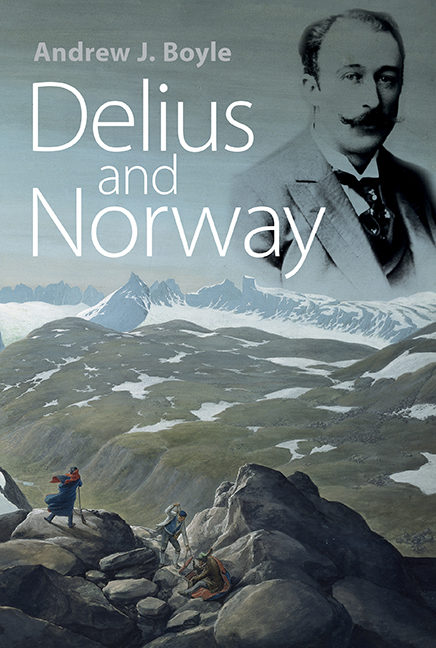Book contents
- Frontmatter
- Dedication
- Contents
- List of illustrations and tables
- Preface
- Abbreviations
- Selected glossary of landscape terms used in place names
- 1 Norway's awakening
- 2 1862–1888: Bradford, Florida and Leipzig
- 3 1888–1889: With Grieg on the heights
- 4 1890–1891: ‘C'est de la Norderie’
- 5 1892–1895: Norway lost
- 6 1896: Norway regained
- 7 1897: Front page news
- 8 1898–1902: Unshakeable self-belief
- 9 1903–1907: Breakthrough in Germany and England
- 10 1908–1912: Changes of direction
- 11 1912–1918: High hills, dark forests
- 12 1919–1934: Myth and reality in Lesjaskog
- Appendix I List of visits to Norway
- Appendix II Works with Norwegian and Danish texts and associations
- Selected bibliography and archival sources
- Index
5 - 1892–1895: Norway lost
Published online by Cambridge University Press: 30 August 2017
- Frontmatter
- Dedication
- Contents
- List of illustrations and tables
- Preface
- Abbreviations
- Selected glossary of landscape terms used in place names
- 1 Norway's awakening
- 2 1862–1888: Bradford, Florida and Leipzig
- 3 1888–1889: With Grieg on the heights
- 4 1890–1891: ‘C'est de la Norderie’
- 5 1892–1895: Norway lost
- 6 1896: Norway regained
- 7 1897: Front page news
- 8 1898–1902: Unshakeable self-belief
- 9 1903–1907: Breakthrough in Germany and England
- 10 1908–1912: Changes of direction
- 11 1912–1918: High hills, dark forests
- 12 1919–1934: Myth and reality in Lesjaskog
- Appendix I List of visits to Norway
- Appendix II Works with Norwegian and Danish texts and associations
- Selected bibliography and archival sources
- Index
Summary
‘For me dramatic art is almost taking the place of religion’
Letter from Delius to Jutta Bell, 29 May 1894Shortly after returning to Paris from Kristiania and the premiere of On the Mountains, Delius moved to a small apartment in the Petit-Montrouge quarter, bounded by Montrouge to the south and Montparnasse to the north. After a few years in rural surroundings, he was now in a densely populated workingclass neighbourhood to which many young artists were moving.
Some notion of Delius's personality and appearance at that time is to be gained through the eyes of those who observed him. Artist Jelka Rosen, his future wife, gives us this portrait:
an aristocratic looking, rather tall, thin man with curly dark hair with a tinge of auburn and an auburn moustache which he was always twisting upwards. […] An old grey hat, his blue vivacious eyes, pale face and red tie, accentuating the pallor. […] I remember the pang of anxiety his pallor gave me. He worked half the night, smoking and drinking red wine, and then stayed in bed late, but disturbed by all the noises in that populous courtyard.
The English composer Isidore de Lara was also in Paris and found Delius ‘ascetic and unworldly’, but, on getting better acquainted, concluded: ‘I never saw a man with such irresistible will, and as it is directed with intelligence, he is sure to come to the front. […] He seems to have the working capacities of a brewer's horse.’ Delius was still living on allowances from his father in Bradford and his uncle in Paris, and could rarely allow himself luxuries. ‘His means were very small, and he cooked his own meals’, recalled de Lara. ‘I have often dined with him in his room on a couple of eggs.’ A young English-American pianist, Harold Bauer, lived nearby, and half a century later his encounter with Delius was still clear in his memory:
[His] tastes in art were as wide and liberal as could be imagined; but he had the strongest feeling that the first duty of any artist was to find ways in which his own personality could be expressed, whether or not the process conformed to traditional methods.
- Type
- Chapter
- Information
- Delius and Norway , pp. 97 - 115Publisher: Boydell & BrewerPrint publication year: 2017



